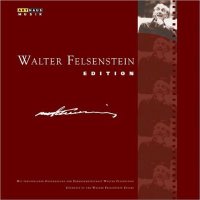Walter Felsenstein Edition
 Mozart: Don Giovanni (1966), Die Hochzeit des Figaro (1976), Beethoven: Fidelio (1956), Offenbach: Hoffmanns Erzählungen (1970), Ritter Blaubart (1973), Verdi: Otello (1969), Janáček: Das schlaue Füchslein (1965)
Mozart: Don Giovanni (1966), Die Hochzeit des Figaro (1976), Beethoven: Fidelio (1956), Offenbach: Hoffmanns Erzählungen (1970), Ritter Blaubart (1973), Verdi: Otello (1969), Janáček: Das schlaue Füchslein (1965)Various soloists; Vienna Symphony Orchestra (Fidelio); Chorus and Orchestra of the Komische Oper Berlin
Stage Director: Walter Felsenstein
Arthaus Musik 101 345 (10 DVD – 911 min)
**** $$$$
What a difference a year can make. The deluxe version of this box was released early in 2008 at a suggested retail price in excess of $500. The bargain version reviewed here may be had for as little as $200. It offers essentially the same exquisitely restored contents as the original and is worth every penny. A cornucopia of supporting documentary material has been retained. Interviews with Felsenstein, production notes and film clips from other performances during the period 1945-1961 enrich the experience of a ‘festival in a box’.
As LP Hartley noted, “The past is a foreign country; they do things differently there.” Arthaus has served the cause of proto-historical opera on film admirably with vintage collections from the Glyndebourne Festival and Hamburg State Opera. The Walter Felsenstein Edition is doubly foreign because Felsenstein plied his trade from 1947 in the other Berlin: the Soviet zone of occupation. Communists exploited and manipulated the arts, and opera was no exception. Felsenstein toiled away for the greater glory of socialism despite the wretched living conditions of East Germany, the bloody suppression of the workers’ revolt of 1953 and the subsequent erection of the Berlin Wall. Violent enforcement of confinement made the place a mockery of the last scene of Fidelio. Felsenstein’s opera house would have been infested with KGB and Stasi informers. That said, the productions on view here reflect a high standard of artistic integrity – at what personal cost to the director, we can only guess.
The Felsenstein Edition bookends the Hamburg State Opera collection (Arthaus 101261) to yield a theatrical ‘Tale of Two Cities’. From the perpetual post-war squalor of East Berlin to the industrial and creative powerhouse of Hamburg in the 1960s was quite a stretch. Felsenstein produced superb interpretations of established fare while Hamburg (under the artistic leadership of Rolf Liebermann) experimented with world premieres of Menotti and Penderecki and may even have produced the definitive Wozzeck on film. The two houses meet head-on with Figaro and it must be said that Hamburg in 1967 prevails, with better singers and a superior conductor (Hans Schmitt-Isserstedt). The Hamburg gaiety comes across as genuine while Felsenstein’s principals are less forthcoming (or perhaps over-rehearsed). It is nevertheless worth watching. The drama of Don Giovanni seems to be intensified by the director’s discomfort with the subject. At 85 minutes, Felsenstein’s treatment of Fidelio may be more like a ‘film based on’ Beethoven’s opera, with plenty of thundering hooves for emphasis but it reveals the roots of his cinematic inspiration. Otello was the first production in colour made by Felsenstein, and it succeeds in no small part thanks to the alert conducting of Kurt Masur. The real gems of the set are the Janáček and the brace of Offenbachs. Cunning Little Vixen receives an ultra-naturalistic approach. The spellbinding score is superbly executed by Václav Neumann in the pit. Tales of Hoffmann and Bluebeard show that the operetta troupe of the Komische Oper included some brilliant comic actors. Names such as Hanns Nocker, Werner Enders and Melitta Muszely may be unknown to us but they were unbeatable in their specialty.
Arthaus lavished extraordinary care on the set and all items were provided with PCM stereo soundtracks. Felsenstein followed the quaint custom of rendering French and Italian librettos into German for the stage. To give him credit, he personally prepared every translation. The set provides an overview of the life’s work of a legendary stage director. It demonstrates that the past is worth revisiting and reminds us of how Felsenstein inspired the following generation of directors on both sides of the inner border.
- Stephen Habington
Buy this CD at amazon.com
Labels: dvd, english, opera, product_review, Walter Felsenstein




0 Comments:
Post a Comment
<$I18N$LinksToThisPost>:
Create a Link
<< Home